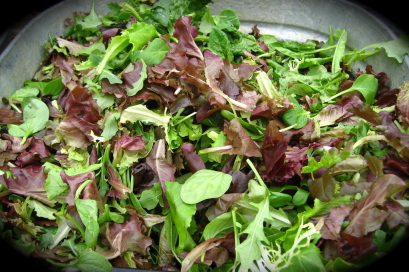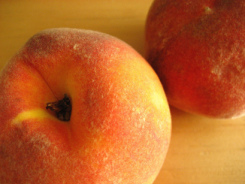Blogging for dietitians
 Wednesday, September 12, 2007
Wednesday, September 12, 2007 Last March, I wrote an article on blogging that has just been published in the latest issue of Dietitians of Canada's Practice. When I wrote it, I wasn't sure I'd still be blogging so I didn't even include my blog address in the article! But six months later, I'm still writing occasional posts as well as regularly adding to my library of web links. I would not have bet money on myself to maintain this commitment...which has become a habit.
I am posting a modifed version of the Practice article here to reflect blogs I am currently reading and recommending as well take advantage of hypertext so you can follow links as you read, which you cannot do from the printed article. I have also corrected the statement about the size of the blogosphere.
Blogging for Dietitians: Cultivating Discovery and Learning, Reflection and Connection
100-Mile Diet, Abbey of the Arts, Poppytalk, You Grow Girl, What to Eat, Worldchanging, Zen Habits - these are the best of the many weblogs I regularly read on diverse topics such as local eating, contemplation, art, gardening, nutrition, sustainability, and personal productivity.
A weblog or blog is a web site with dated entries (called posts) in reverse chronological order. Most blogs combine characteristics of the personal journal (regular updates, personal reflection) with links to other web pages. Other standard blog features are archives of posts by date and subject (this facilitates retrieval), and interaction (sometimes evolving to lively discussion and debate) between the writer and readers in a Comments section. Bloggers create and maintain sites for professional communication or personal expression or both: there are blogs by and for journalists, librarians, web designers, scientists and photographers, as well as environmentalists, knitters, foodies and stay-at-home parents. As of March 2007, there were over 71 million blogs in the blogosphere (all blogs on the Internet). Very few are "dietitian blogs." In this article, I explain why I started blogging and I’ll offer reasons other dietitians may want to read blogs – or write their own.
The reasons I blog are growing. I began in early 2006 to try to organize my online resources. I realized that writing a brief description of each resource made me think more critically and read at least part of it in the moment, rather than filing it in the overflowing "to read later" basket. Making my blog public was the next step. While some blog platforms have the option of keeping posts private, I decided to take the risk. My reasoning was that if I found a resource useful, perhaps some of my colleagues would too. I gathered up my courage and pressed "publish." Now that I publish for potential readers, I realize I am both writing to learn and learning to write. Writing requires that I carefully check my understanding of a topic; I have learned the truth in the expression that the best way to learn something is try to explain it to someone else. I find writing difficult and draining, but know that the only way to improve my skills and become clear, concise and precise is to practice. (If you have already read my blog, thank you for letting me practice on you!)
I'm embarrassed to admit that the most personal reason I went public with blogging was that I’m a bit of a geek. Wikipedia, a popular online encyclopedia, defines “geek” as “an individual who is fascinated by knowledge and imagination, usually electronic or virtual in nature." You might say I am nurturing my inner geek as I pursue a passion for exploring how computer technology, particularly web-based applications, can enhance dietitians’ practice.
Many of the first blogs I read were written by and for librarians. I thought that dietitians, who are mavens of nutrition information, should be blogging too. We share our collective knowledge in face-to-face encounters at work (when busy schedules allow), and education days and conferences. I was interested in how we could do this during the in-between times or when separated by distance? How could we keep up our enthusiasm for action plans after a particularly inspiring workshop? How could we nurture collegiality within and across health regions and provinces/territories? How could nonprofit nutrition societies, networks or practice groups disseminate information easily and economically on the Web? Blogs and blogging may be part of the answer to build and nurture a thriving community of practice.
Brady’s (2005) online paper expressed much of what I've said but in much more scholarly language. The paper concludes with this statement that particularly resonates with me:
Blogs can act as a door into the knowledge society. They enable people to accumulate knowledge as well as share and manage it. But blogs are merely tools; they are not the golden ticket into the knowledge society. Knowledge is synthesized by communication between people sharing objectives. Blogs facilitate this by making people easier to find and facilitating immediate and direct communication channels....foster[ing] collaboration between bloggers as well as forming diverse types of communities that can engage in activities such as research and problem solving (Brady, p. 13).
Brady’s definition is why I promote ethical blogging. You may have already discovered that blogging is not necessarily benign. As blogging ethics deserves a separate Practice article, I refer you to two guides that can help us blog responsibly: Dietitians of Canada's Code of Ethics and A Bloggers' Code of Ethics.
Acknowledgement
A special thank-you to Gillian Naylor Villeneuve, MEd, RD who provided valuable suggestions for this article.
Resources
Brady, M. (2005) Blogging, personal participation in public knowledge-building on the web, Chimera Working Paper 2005-02. Colchester: University of Essex. Available at www.essex.ac.uk/chimera/content/pubs/wps/CWP-2005-02-blogging-in-the-Knowledge-Society-MB.pdf. Accessed 21 March 2007.
Dietitians of Canada's Code of Ethics . Available at www.dietitians.ca/public/content/career_in_nutrition/code_of_ethics.asp.
A Bloggers' Code of Ethics. Available at: www.cyberjournalist.net/news/000215.php.

